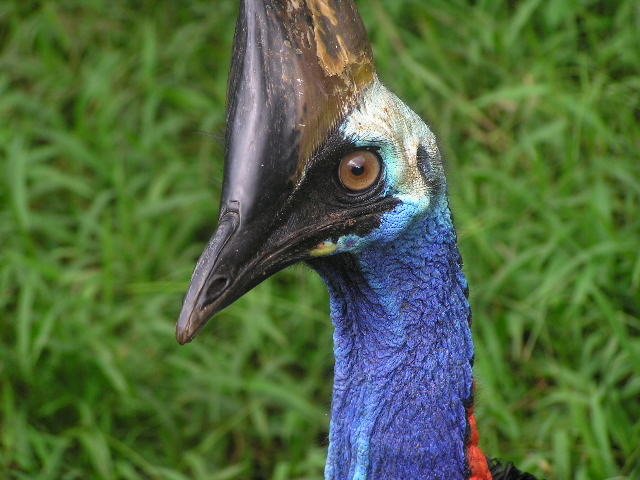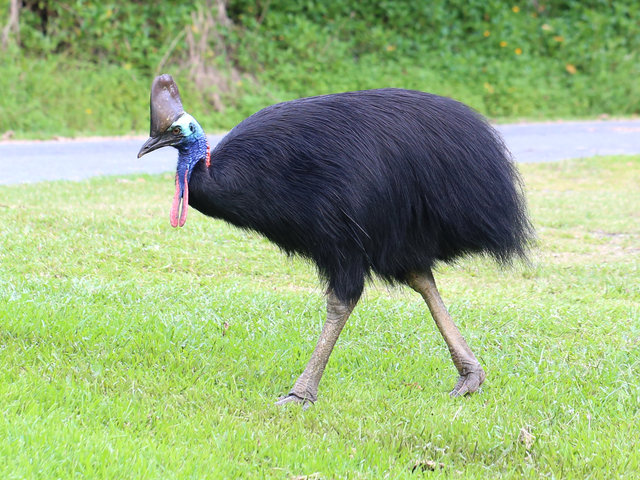Newly Discovered Dinosaur Was Modern-Day Ornery Bird’s Doppelganger

The dinosaur, Corythoraptor jacobsi, offers researchers insights on why some birds may never have been meant to fly.
The dinosaur, Corythoraptor jacobsi, offers researchers insights on why some birds may never have been meant to fly.
Birds evolved from dinosaurs, but it is often hard to imagine how these animals could be related to one another. Tiny songbirds hardly conjure up mental images of Tyrannosaurus rex.
A newfound Late Cretaceous carnivorous dinosaur, however, is a doppelganger for living cassowaries, which are the third-tallest and second-heaviest modern birds, smaller only than the emu and ostrich. Cassowaries have the ability to kill animals, including humans, by charging and kicking them.
The new dinosaur, described in an article in the journal Scientific Reports, was — like cassowaries, emus, and ostriches — covered with feathers, yet it could not fly. Lead author Junchang Lu and colleagues think it is possible that today’s flightless birds never did have ancestors that took to the skies. Feathers can serve functions other than enabling flight, such as by providing insulation and enabling forms of visual communication.
The dinosaur’s most distinctive feature had nothing to do with feathers, though, but did inspired its name: Corythoraptor jacobsi. Corythoraptor refers to a “raptor bearing a cassowary-like crest” on its head. The crest, technically known as a casque, was like a horn helmet covered with keratinous skin. Keratin is a fibrous protein that forms the main structural constituent of hair, claws, and other tough tissues.

“The casque may have been a multifunctional structure, utilized in display and communication,” said Lu, who is a researcher at the Chinese Academy of Geological Sciences. “It might have served as an expression of fitness during the mating season.”
Like horns on deer and antelope, the dinosaur’s casque might have helped choosy individuals to select their mates by using the size, shape, and other features of the head structure as visual fitness cues.
Cassowaries use their casques for similar reasons, although scientists continue to debate other possible functions. Some suggest the head feature is great for cutting through underbrush, while others think it might amplify the big bird’s deep sounds.
Cassowary calls are so creepy sounding that they have been included in horror film soundtracks. It is possible that dinosaurs like Corythoraptor produced similar vocalizations.
The researchers suspect that Corythoraptor craved meat.
“They might have eaten lizards, small dinosaurs, and other small animals,” Lu explained.
.jpg)
The dinosaur hunted such prey at what is now Jiangxi Province, China. Its remains, dating to 66-100 million years ago, were unearthed there near the Ganzhou Railway Station. The individual was at least eight years old when it died, the scientists suspect, but it was just a young adult that had not fully grown.
Lu and his team now believe that Ganzhou “was home to the world’s greatest known dinosaur diversity.”
Numerous other dinosaurs of all shapes and sizes have been discovered at this location over the years. Banji long, for example, once lived there and was a small and scrappy carnivore with a parrot-like face. It and many other dinosaurs once flourished where high-speed trains now zip through Ganzhou.
The past could also meet the present in terms of Corythoraptor’s lineage. The researchers cannot confirm that the dinosaur was directly related to today’s cassowaries, but the similarities between these birds and the dinosaur are numerous: head casques, long necks, chubby feathered bodies, muscular legs, an appetite for meat and more.
Cassowaries are found in Queensland, Australia, though, which is some 4,641 miles away from Corythoraptor’s southern China homeland. Additional fossil finds could help to determine if the dinosaur was a direct ancestor of cassowaries, or if the similarities in appearance emerged due to independent evolution.
good @tha199
Hi! I am a robot. I just upvoted you! I found similar content that readers might be interested in:
https://www.seeker.com/earth/animals/newly-discovered-dinosaur-might-be-a-direct-descendent-of-a-fierce-living-bird
upvote
hi https://steemit.com/@mahboobfsd/feed
Hi! I am chandan kumar upvote my post https://steemit.com/@chandankumar007
upvoted
Interesting post. Following and upvoted. :)
great post
Hi follow me upvote me and I will also do that
goodone